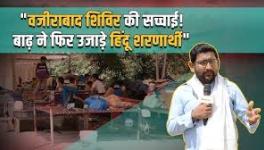Whatsapp Group Admin not Vicariously Liable for Posts by Members: Kerala HC
Image Courtesy:gadgets360.com
In a body-blow to the Surveillance State, the Kerala High Court has ruled that the admin (administrator) of a Whatsapp group is not vicariously liable for an objectionable post made by a group member.
In an order dated February 23, 2022, the court said, “A vicarious criminal liability can be fastened only
by reason of a provision of a statute and not otherwise. In the absence of a special penal law creating vicarious liability, an Admin of a WhatsApp group cannot be held liable for the objectionable post by a group member.”
Though this order was in connection with a case where a Whatsapp group member had posted a child pornography clip on the group, that led to the group admin also being implicated in a POCSO case, the HC order has far-reaching ramification in cases related to Whatsapp groups being used by activists and dissenters. Privacy advocates, digital rights groups and internet freedom activists have pointed out how one malicious post by a rogue group member ought not to be deemed enough to implicate the group admin, as it can become a handy tool for the Surveillance State to trap and implicate dissenters.
What is Vicarious Liability?
The court, in its order recorded, “Vicarious liability is a form of a strict, secondary liability that arises under the common law doctrine of agency; respondent superior – the responsibility of the superior for the acts of their subordinate, or, in a broader sense, the responsibility imposed on one person for the wrongful actions of another person. Such a liability arises usually because of some or the other legal relationship between the two. This often occurs in the context of civil law—for example, in employment cases.”
It further clarified, “There is no law by which an Admin of any messaging service can be held liable for a post made by a member in the group. A WhatsApp Admin cannot be an intermediary under the IT Act. He does not receive or transmit any record or provide any service with respect to such record. There is no master-servant or a principal-agent relationship between the Admin of a WhatsApp group and its members.”
Brief background of the case
The matter dealt with a case where the Petitioner had created a Whatsapp group titled FRIENDS. On March 29, 2020, a member had posted a video depicting child pornography to the group. On June 15, 2020 the Ernakulam police registered a case against the poster of the video for offences under
Sections 67B (a)(b) and (d) of the Information Technology Act, 2000 (for short, 'the IT Act') and Sections 13, 14 and 15 of the Protection of Children from Sexual Offence Act, 2012 (for short, 'the POCSO Act'). He was thus the primary accused in the case. However, the Petitioner was also arrayed as Accused No. 2 in the case that was pending as SC No.61/2021 at the Additional Sessions (Cases Relating to Atrocities and Sexual Violence Against Women and Children) Court, Ernakulam.
That’s when the Petitioner moved court to have the charges against him be dropped. In light of the court’s conclusion with respect to vicarious liability, the proceedings against the Petitioners will now be quashed.
Judge Dr. Kauser Edappagath ruled, “There is nothing on record to suggest that the petitioner has published or transmitted or caused to be published or transmitted in any electronic form the alleged obscene material or he browsed or downloaded the said material or, in any way, facilitated abusing children online so as to attract Sections 67B (a), (b) or (d) of the IT Act. Similarly, the prosecution has no case that the petitioner used children in any form of media for his sexual gratification or used them for pornographic purpose or stored, for commercial purpose, any child pornographic material in order to attract Sections 13, 14 or 15 of the POCSO Act.”
The judge further recorded in the order, “Since the basic ingredients of the offences alleged are altogether absent as against the petitioner, I am of the view that it is a fit case where the extra ordinary jurisdiction vested with this Court under Section 482 of Cr.P.C could be invoked.”
The court finally ruled, “For the reasons stated above, the entire proceedings in SC No.61/2021 at the Additional Sessions (Cases Relating to Atrocities and Sexual Violence Against Women and Children)
Court, Ernakulam as against the petitioner is hereby quashed.”
The entire order may be read here:
Get the latest reports & analysis with people's perspective on Protests, movements & deep analytical videos, discussions of the current affairs in your Telegram app. Subscribe to NewsClick's Telegram channel & get Real-Time updates on stories, as they get published on our website.
























